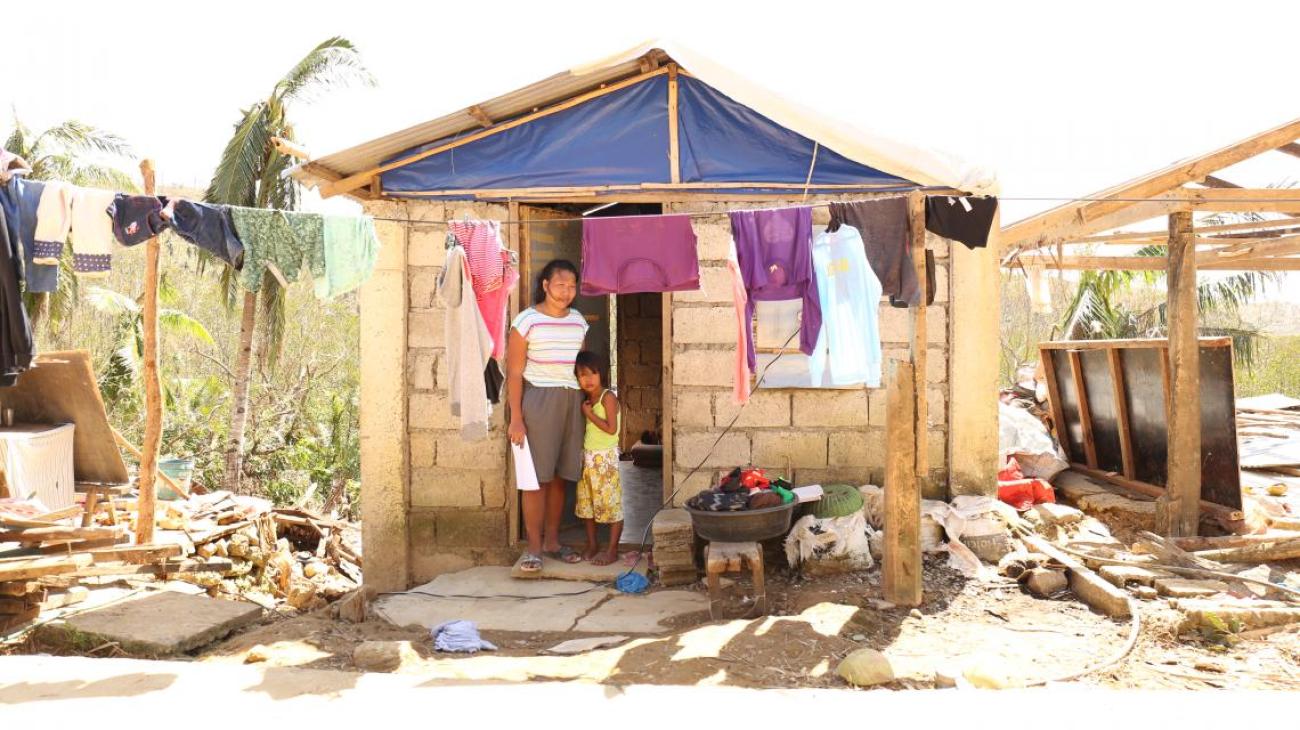Caring for children affected by Super Typhoon Rolly/Goni

A story of one of the first humanitarian workers deployed to conduct assessment two days after Rolly destroyed Catanduanes
By Geo Lapina, UNICEF Philippines WASH Officer
The first time I saw the destruction with my own eyes, memories from Typhoon Haiyan and other typhoons I experienced came flooding all over again. I’ve covered many emergencies in my career, but what makes this different from the others is that Catanduanes is isolated because it is an island. There is no communication and electricity in the villages we visited. There are no flights and ferries to take you there because the weather conditions make it difficult. Water systems have been destroyed, there are no accommodations and most fishermen’s boats have been rendered unusable by the destructive winds of the Super Typhoon.
Urgent needs
In the villages I visited I met a family, Raul and Jocie Camacho who are now living in a day care center because their house was completely destroyed. Raul told me that the storm surge traveled inland about 300 meters. He is no longer able to make a living because his boat was destroyed, and his diving mask was washed away in the flood. I became worried for his family, including his grandsons. In his village they only have water from a damaged water line, they could not boil water because their pots, pans and utensils are all gone, and there was no electricity and no stove.
I’ve covered many emergencies in my career, but what makes this different from the others is that Catanduanes is isolated because it is an island.
UNICEF Philippines/2020/GLapina
The Camacho family’s house was completely destroyed by Super Typhoon Rolly/Goni. They are now temporarily living in a day care center.
I also went to Bato, Catanduanes where the first landfall happened. I met local officials who were worried for their neighbors. They only had food for a week, then after that they said they didn’t know how they were going to eat. With at least 80 per cent of their crops and livelihood coming from harvesting abaca fibers, they asked for seedlings. I learned that it would take around two to three years to grow abaca again. They would need alternative sources of income fast. Among the things they needed are medicines for dengue and diarrhea (which they’re anticipating to increase in the coming days), tetanus toxoid because of injuries, and vitamins. They have managed to keep vaccines cold because of the one generator that they had, but with fuel costs they might not have the resources to keep that running for long, especially with another typhoon that just hit.
A colleague in the path of the typhoon
I also visited a UNICEF colleague who is from Catanduanes. Pete was his usual smiling self despite what he and his family just went through. Pete and I went around his village to survey the damage. He told me how they hid in cabinets while the violent winds and rain destroyed their ceiling. Around 30 of their family and neighbors stayed with them because their houses were destroyed. Pete also told me that one of the children they were taking care of exhibited signs of stress when the winds started blowing again. I left Pete with some medicines and a satphone to make sure that we had a way to contact him. He said that even being a UNICEF staff could not prepare you for something like this, and he was relieved that he had a colleague to talk to.
I also visited a UNICEF colleague who is from Catanduanes. Pete was his usual smiling self despite what he and his family just went through.

UNICEF Philippines/2020/GLapina
I visited our UNICEF colleague Pete from Catanduanes and brought him medicines and a sat phone. They had to take in some neighbors because many houses were destroyed.
By the end of my visit there were a million thoughts crossing my mind. The effect of this typhoon on children is massive. As a WASH expert, I worried about them getting sick with water-borne diseases. Because of the loss of livelihood and lack of food, their nutrition will also suffer. Their learning modules are all gone, their schools are flooded and destroyed. I saw some children helping their parents rebuild their houses, I’m worried they might injure themselves from the debris.
Most of all, children need psychosocial support because of what they experienced. While I was there, I felt how violent the winds can be, and imagined how a child must have felt then. With more typhoons on the way, communities that have only begun recovering might find themselves back to zero all over again.
UNICEF Philippines/2020/GLapina
I talked to this mother and child in Baras. She wishes that their life will return to normal, that their house will be rebuilt and that her husband can return to work.


